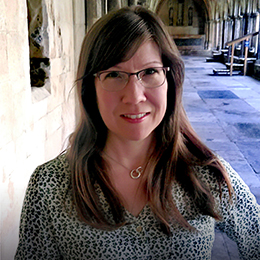Kristi Woodward Bain
 Why did you choose Northwestern?
Why did you choose Northwestern?
After completing my master's in medieval history in 2022, I took some time off from full-time academia to teach in community colleges and secondary schools. But even after six years of teaching and learning from amazing students and colleagues, I was still drawn to dedicating myself to researching as well as teaching. What I wanted from a PhD program was a big ask: I knew wanted to work with brilliant medievalists with incredible academic records, but who were also down-to-earth enough to value the winding path that I had taken prior to applying to grad school. After a few interviews with potential advisors, a common theme kept popping up: if you want to work with the best medievalists in the country (and beyond!), then you must apply to Northwestern. I still remember how shocked I was when I found out I had been accepted to the program, and to this day I still feel incredibly blessed to have found and been accepted by Northwestern's religious studies program.
How would you describe your research and/or work to a non-academic audience? What was it then and/or what is it now?
Like many PhDs, my research topic was grounded in personal experience. I grew up in a rural area in which evangelical churches predominated, and the church to which one belonged determined much of your social and cultural experiences. Once I left both my hometown and the evangelical church that I attended, I began to notice that no matter how pious a congregation seems, there is always some sticking point, often seemingly minor, that threatens a church community's cohesion. In my church, it was the color of the new pews that was the tipping point for many after a long, contentious fundraising scheme for the new building. For the medieval and contemporary parishioners in my research, it was the style and use of the bell tower that catalyzed internal factions and outright violence. My dissertation—"From Community Conflict to Collective Memory: Lived Religion and the Late Medieval Parish Church"—examined the many ways in which medieval and contemporary parish communities cared and even fought for their church buildings. For parishioners then and now, the medieval church buildings in which they worship serve far more than a religious purpose--they are the glue that holds the community together, embodying their history, heritage and memories.
This research has informed the winding path (yes, there is a pattern here!) my career has taken since completing my PhD in 2014, which has primarily taken shape in the United Kingdom, where I undertook most of my dissertation research. I have worked in the Norwich Cathedral Library as a parish research assistant and outreach officer; as a heritage consultant for parish churches across England; served on local heritage committees as a trustee or member of advisory boards; worked as a research impact coordinator and consultant at the University of Cambridge and for US universities; and presently am responsible for developing, managing and directing a programme for the University of Cambridge's libraries and museums to support new research based on the university's vast and historic collections. All this is in some way or another based in the research that I started with my PhD, which gave me experience in being just as comfortable researching an archive as I am consulting, teaching, or helping colleagues to develop their own research. That's what I love about the research I did as a PhD student and candidate--I could think within and outside the University, and I was fully supported in taking this unique approach to academia.
Tell us who or what inspired your research and/or work.
So many people have inspired me, especially those who have taught and mentored me! My high school English teacher, Mrs. Sarah Dannar; my Freshman history professor, Janice Falcone; my Master's advisor, Lois Huneycutt; and my PhD adviser, Richard Kieckhefer. They helped me to grow as a scholar (and grow up as a person!) and continue to offer their support, mentorship, and friendship.
What are you most proud of in your career to date?
I know it is a bit predictable, but I am going to state it anyway: I am still and will continue to be proud of being a PhD from Northwestern. And I absolutely love the work that I currently do at the University of Cambridge. No, I am not a full-time, 'traditional' academic, and I never thought that was the only path for me once I obtained my PhD anyway. There is something incredible about drawing upon one's own research expertise and experience to enrich and support the research of others. I sometimes care as much about my colleagues' research as I do my own!
Moreover, I am proud of the mentoring and tutoring that I have the opportunity to do through my membership at Newnham College, Cambridge, and through early career mentoring programmes at the University. I will always say that it was the support I received from those who inspired my research and work that got me to where I am today more than anything else--and now I am enjoying paying that forward.
Tell us about a current achievement or something you're working on that excites you.
I have just been elected to a Bye-Fellowship at Newnham College and will also start my second year there as an undergraduate tutor, and I am very excited to be a part of this incredible community of women!
What advice would you give your younger self or someone considering a similar path?
Your inner voice may constantly tell you that you are not good enough to get a PhD, work at Cambridge, do what you love no matter how impractical it seems...but when that happens, listen instead to those who have your back: your teachers, mentors, advisors, colleagues, friends, and family. One day, what they believe about you will also be what you start to believe about yourself.